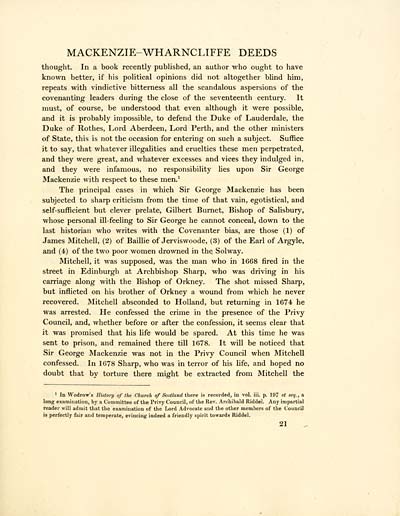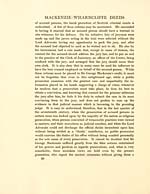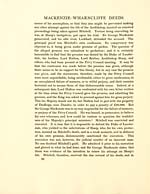Download files
Complete book:
Individual page:
Thumbnail gallery: Grid view | List view

MACKENZIE-WHARNCLIFFE DEEDS
thought. In a book recently published, an author who ought to have
known better, if his political opinions did not altogether blind him,
repeats with vindictive bitterness all the scandalous aspersions of the
covenanting leaders during the close of the seventeenth century. It
must, of course, be understood that even although it were possible,
and it is probably impossible, to defend the Duke of Lauderdale, the
Duke of Rothes, Lord Aberdeen, Lord Perth, and the other ministers
of State, this is not the occasion for entering on such a subject. Suffice
it to say, that whatever illegalities and cruelties these men perpetrated,
and they were great, and whatever excesses and vices they indulged in,
and they were infamous, no responsibility lies upon Sir George
Mackenzie with respect to these men. 1
The principal cases in which Sir George Mackenzie has been
subjected to sharp criticism from the time of that vain, egotistical, and
self-sufficient but clever prelate, Gilbert Burnet, Bishop of Salisbury,
whose personal ill-feeling to Sir George he cannot conceal, down to the
last historian who writes with the Covenanter bias, are those (1) of
James Mitchell, (2) of Baillie of Jerviswoode, (3) of the Earl of Argyle,
and (4) of the two poor women drowned in the Solway.
Mitchell, it was supposed, was the man who in 1668 fired in the
street in Edinburgh at Archbishop Sharp, who was driving in his
carriage along with the Bishop of Orkney. The shot missed Sharp,
but inflicted on his brother of Orkney a wound from which he never
recovered. Mitchell absconded to Holland, but returning in 1674 he
was arrested. He confessed the crime in the presence of the Privy
Council, and, whether before or after the confession, it seems clear that
it was promised that his life would be spared. At this time he was
sent to prison, and remained there till 1678. It will be noticed that
Sir George Mackenzie was not in the Privy Council when Mitchell
confessed. In 1678 Sharp, who was in terror of his life, and hoped no
doubt that by torture there might be extracted from Mitchell the
1 In Wodrow's History of the Church of Scotland there is recorded, in vol. iii. p. 197 et seq., a
long examination, by a Committee of the Privy Council, of the Rev. Archibald Riddel. Any impartial
reader will admit that the examination of the Lord Advocate and the other members of the Council
is perfectly fair and temperate, evincing indeed a friendly spirit towards Riddel.
21
thought. In a book recently published, an author who ought to have
known better, if his political opinions did not altogether blind him,
repeats with vindictive bitterness all the scandalous aspersions of the
covenanting leaders during the close of the seventeenth century. It
must, of course, be understood that even although it were possible,
and it is probably impossible, to defend the Duke of Lauderdale, the
Duke of Rothes, Lord Aberdeen, Lord Perth, and the other ministers
of State, this is not the occasion for entering on such a subject. Suffice
it to say, that whatever illegalities and cruelties these men perpetrated,
and they were great, and whatever excesses and vices they indulged in,
and they were infamous, no responsibility lies upon Sir George
Mackenzie with respect to these men. 1
The principal cases in which Sir George Mackenzie has been
subjected to sharp criticism from the time of that vain, egotistical, and
self-sufficient but clever prelate, Gilbert Burnet, Bishop of Salisbury,
whose personal ill-feeling to Sir George he cannot conceal, down to the
last historian who writes with the Covenanter bias, are those (1) of
James Mitchell, (2) of Baillie of Jerviswoode, (3) of the Earl of Argyle,
and (4) of the two poor women drowned in the Solway.
Mitchell, it was supposed, was the man who in 1668 fired in the
street in Edinburgh at Archbishop Sharp, who was driving in his
carriage along with the Bishop of Orkney. The shot missed Sharp,
but inflicted on his brother of Orkney a wound from which he never
recovered. Mitchell absconded to Holland, but returning in 1674 he
was arrested. He confessed the crime in the presence of the Privy
Council, and, whether before or after the confession, it seems clear that
it was promised that his life would be spared. At this time he was
sent to prison, and remained there till 1678. It will be noticed that
Sir George Mackenzie was not in the Privy Council when Mitchell
confessed. In 1678 Sharp, who was in terror of his life, and hoped no
doubt that by torture there might be extracted from Mitchell the
1 In Wodrow's History of the Church of Scotland there is recorded, in vol. iii. p. 197 et seq., a
long examination, by a Committee of the Privy Council, of the Rev. Archibald Riddel. Any impartial
reader will admit that the examination of the Lord Advocate and the other members of the Council
is perfectly fair and temperate, evincing indeed a friendly spirit towards Riddel.
21
Set display mode to:
![]() Universal Viewer |
Universal Viewer | ![]() Mirador |
Large image | Transcription
Mirador |
Large image | Transcription
Images and transcriptions on this page, including medium image downloads, may be used under the Creative Commons Attribution 4.0 International Licence unless otherwise stated. ![]()
| Histories of Scottish families > Ancient deeds and other writs in the Mackenzie-Wharncliffe charter-chest > (43) Page 21 |
|---|
| Permanent URL | https://digital.nls.uk/95523881 |
|---|
| Description | A selection of almost 400 printed items relating to the history of Scottish families, mostly dating from the 19th and early 20th centuries. Includes memoirs, genealogies and clan histories, with a few produced by emigrant families. The earliest family history goes back to AD 916. |
|---|

